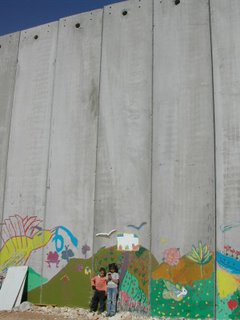 NEW YORK, USA, 2 August 2006 – Since there are no places to play in Al Zaytoun, children wander the streets, improvising their own games in the heavily populated area east of Gaza City. Poverty is rife and ongoing hostilities have made matters worse.
NEW YORK, USA, 2 August 2006 – Since there are no places to play in Al Zaytoun, children wander the streets, improvising their own games in the heavily populated area east of Gaza City. Poverty is rife and ongoing hostilities have made matters worse.To help with the humanitarian crisis, UNICEF and its partners have been conducting special psychosocial counselling sessions in addition to their regular support programmes.
“UNICEF is reaching out to children and parents in order to help them deal with their distress,” says UNICEF Special Representative in the occupied Palestinian territory Dan Rohrmann.
“At the moment, we have every day something going on to help children in all the districts in Gaza,” notes Mr. Rohrmann, pointing out that UNICEF is organizing group workshops like the one in Al Zaytoun, along with individual support sessions and daily summer festivals for children.
“This is, of course, in addition to trying to create lesson-friendly spaces and safe play areas, and providing health and education, as well as child protection,” he adds.
Fears come to the surface
The special programmes are needed because the situation for children living in Gaza and the West Bank is bleak. Many essential services have been disrupted, and in July alone, 37 children were killed in the occupied Palestinian territory – 34 in Gaza and 3 in the West Bank. Some 100 children were injured.
Children’s fears, exacerbated by their exposure to violence, surface during the sessions at the Al Zaytoun psychosocial workshop.
“There was a school and then there was this plane flying over the school,” says Shaban, 10, explaining the drawings he has just finished. “And it dropped a missile on the school.”
Armed hostilities in Gaza come at a time when children would normally be enjoying their summer vacation. “These days, there is shelling here and I’m not very happy in life,” laments Ahmed, 11. “Because of the shelling, I can’t go to the beach, we can’t go on picnics. I’m scared. You can’t live your life.”
Restoring a sense of normalcy
Twelve UNICEF-supported psychosocial emergency teams are operating in the occupied Palestinian territory, with seven in Gaza and five in the West Bank.
The sessions they conduct are aimed at reinforcing children’s capacity to protect themselves, cope with violence and restore some sense of normalcy to their lives.
Since the beginning of the year, nearly 10,000 Palestinian children have participated in the workshops. In light of increased stress caused by the ongoing crisis, UNICEF is stepping up its psychological support projects in an effort to reach 10,000 children each month.
Source: UNICEF
VIDEO: Addressing psychosocial needs high low

No comments:
Post a Comment